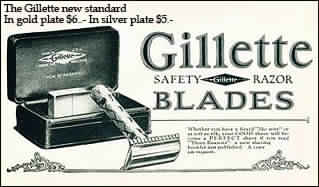‘Toxic masculinity reaches every corner of WHS’

Photo Wikimedia Commons
On Jan. 13, Gillette released a commercial confronting the issue of toxic masculinity and its relation to the #MeToo movement. While the message was revolutionary, especially from a company that promotes the ideal image of men, the response was mixed. Many praised Gillette for adopting this platform, claiming that it was a step in the right direction in tackling toxic masculinity. There were, however, some that found the advertisment condescending.
While the commercial incited controversy, we can at least applaud Gillette’s attempt to shed some light on male issues like toxic masculinity. According to tolerance.org, toxic masculinity is defined as a narrow and repressive description of manhood defined by violence, sex, status and aggression, meaning that anyone who breaks the stereotypical view of man is seen as different and is often criticized. We see toxic masculinity in many aspects of society, from television and music to our daily life.
In many high schools, male students are often expected to wear certain types of clothing, play sports and take classes pertaining to STEM and business instead of classes in the arts. This has influenced our lives as male writers for the Hi’s Eye. As two of only four male writers on the staff, we have had to break this gender norm to be part of the publication. On top of that, we feel that we are expected to be sports editors or write about sports for the publication because that is what others assume we know, so writing about the arts or stories that could be seen as “feminine” sometimes feels uncomfortable.
Toxic masculinity reaches every corner of WHS, whether it directly affects every male student or not. Toxic masculinity is a topic that most guys shy away from addressing, for fear of being seen as too sensitive or not masculine enough. In fact, when a fellow Hi’s Eye staffer pitched the idea for this article, we were both hesitant to write about this topic for that reason. The more we push this topic aside and leave it unaddressed, however, the more the issue festers and grows.
It is up to guys to start addressing this issue. Talking about toxic masculinity isn’t telling guys how to and not to act, but that our behavior, in and out of school, shouldn’t be solely dominated by those traits. That is the true message of Gillette’s advertisement, and that’s why it’s something we need to be willing to discuss.

Chris Quinn • Mar 13, 2019 at 6:36 pm
Back in the 70’s, I was elected by my peers to be one of Hi’s Eye’s tri-editors. I was the only female elected to the leadership role and the teacher directly expressed his disappointment that I got the position, and excluded me from all mentoring and meeting with the other try editors – I experienced my first “squeeze out” when I was frickin’ 17 years old. Was it fun? Well, not that part, but every other part of the experience was! And did it hold me back? No, I used it to build fear extinction – that is, to take my leadership roles seriously and go for it and just ignore the emotional disdain of power. I went on to become an entrepreneur, a leader in my industry, a builder of my community, and a specialist in human and group development. And there were a lot of newsletters….